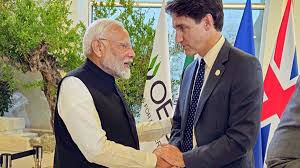
Khalistan leds to diplomatic row- India has adopted a diplomatic countermeasure by withdrawing its ambassador to Canada and degrading relations over the matter of the Khalistan crisis. Since the Indian administration was in a dispute to separate a Sikh state named Khalistan, it has been a main issue of conflict between the two countries.
Canada, having a considerable number of Sikh population, has witnessed a renewed agitation over the past couple of decades. This has offended India, which perceives any backing to the movement as an attempt towards subverting its integrity.
The situation went into a critical phase when reports emerged that some Canadian officials were enjoying a supportive inclination towards pro-Khalistan operations, which New Delhi sees as a move towards separatism.
India did not sit idle, though; it sent a clear signal by recalling its envoy from Canada. It is a sign that the country is not happy with how the latter is handling things. Hence, by reducing diplomatic ties, India aims at escalating the problem and asserting the stand that it stands for respecting its territorial integrity.
This diplomatic move is a clear sign of the relations between the two countries despite the fact they have had long-standing business, cultural, and social relations. But, the escalation could have broad implications for the two countries’ cooperation and stability in the region.
Many Canadian Sikhs are now caught in the crossfire. It shows the potential consequences of global politics when domestic problems affect neighbors, highlighting the human impact of the crisis.

An Overview Of the Khalistan Movement
Khalistan movement is a separatist militant Political organization’s operation that agitates to form a sovereign Sikh nation inside the Punjab region of India. The movement was born on political and religious grounds in the 1970s and 1980s, with the Sikh leader challenging the perceived discrimination against the Sikhs.
Relations became acute when, in the year 1984, Indira Gandhi imposed the army’s Operation Blue Star to flush out militants who had taken refuge in Sikhism’s holiest shrine, the Golden Temple. This case resulted in a Dalit uprising in which Sikh bodyguards assassinated Prime Minister Indira Gandhi, and anti-Sikh riots followed.
Though the movement has largely lost its mojo in India, it has some backers among the Sikh population despite being dispersed in various countries, including Canada and the United Kingdom.
India regards any advocacy of Khalistan as dangerous for its unity and sovereignty, which has a negative impact on Indian diplomatic relations even with those countries where Khalistan supporters are active. Today, it is still bloated, loaded with passion, and is an influential movement.

Impact On India-Canada Relations
These developments over the Khalistan issue have further exposed the new level of tension within the India-Canada relations. Such recall and downgrading of diplomatic relations is a serious shift for India, which was once a close friend of that country and had very trade, cultural, and political relations.
The Khalistan movement is something India looks at as a destructive force within its country, hence the conflict between the two nations, with some parts of Canada’s Sikh communities sympathetic to the movement.
India has raised concerns about what it perceives as a lenient approach towards pro-Khalistan elements in Canada. While Canada, under the banner of free speech, has categorically denied any support for separatism. The potential consequences of this conflict are concerning.
The threat to diplomatic relations could have a ripple effect on economic cooperation and immigration policies. This situation also presents a challenge for the significant Sikh population in Canada, which maintains strong cultural and family ties to India. The ongoing debate underscores the complex dynamics of international relations, where domestic politics can significantly influence foreign policies.

Analysis Of India’s Diplomatic Response
The Indian diplomatic counter to the increasingly violent situation with Canada over the Khalistan issue remains a strong statement of the Indian non-negotiable position on sovereignty.
India has conveyed its displeasure over what it perceives as a Canadian soft attitude toward pro-Khalistan activists by recalling its ambassador and reducing the level of diplomatic relations between the two countries.
Evidence also shows that India is increasingly becoming impatient with what it regards as the Canadian authorities’ inability to act against activities that are deemed to undermine the country’s unity and territorial integrity.
India’s decision is also a statement made for itself to Canada and the rest of the world that it has no penchant for allowing foreign forces to interfere with internal politics, especially issues pertaining to unity.
However, lowering diplomatic relations poses certain risks since it undermines trade, investment, and people’s discussions. While the Indian response reflects its assertiveness. The costs associated with this effect cannot be perceived favorably, especially when it transmits such signals to an important strategic partner such as Canada.

